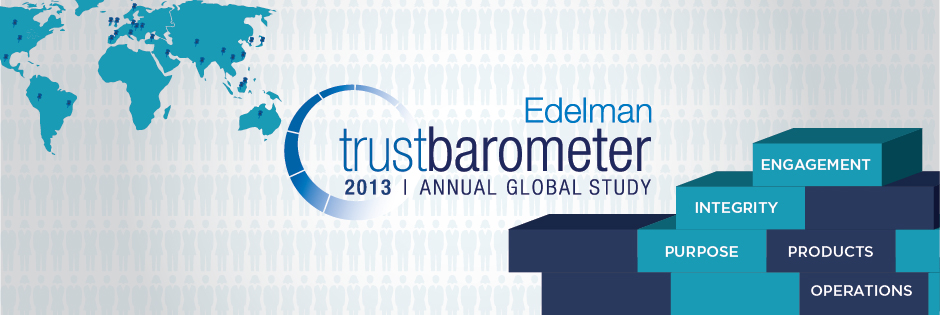 |
The 13th Edelman Trust Barometer study launched this week, and the results couldn't be more disturbing for business executives and government officials.
As usual, the study takes the temperature of the public's trust in institutions worldwide. The watershed finding in 2012: less than one in five respondents believes a business or governmental leader will actually tell the truth when confronted with a difficult issue.
Edelman's report cites high-profile scandals involving CEO and government officials, including former McKinsey managing partner Rajat Gupta, former Chinese government official Bo Xilai and Lance Armstrong, former chairman of the Livestrong Foundation, as drivers of distrust in 2012.
“We’re clearly experiencing a crisis in leadership,” said Richard Edelman, president and CEO, Edelman in a statement. “Business and governmental leaders must change their management approach and become more inclusive by seeking the input of employees, consumers, activists and experts such as academics, and adapting to their feedback. They must also pass the test of radical transparency.”
The good news, says the study, is that companies are changing their approach in how trust is established, placing greater importance on engagement and integrity-based attributes such as treating employees well, listening to customers and exhibiting ethical and transparent practices.
Yet it's clear that leaders themselves aren't passing that test of transparency. The study found that trust in business to do what is right is at 50% while trust in business leaders to tell the truth is 18%, a 32-point trust gap. The gap between government and government official is 28 percentage points. The trust gap between business and business leader is amongst the largest (35 points) in the U.S. and China. At 47 points, China had the greatest divide between government and government official.
How can communicators lift their leaders above these alarming levels of global mistrust?
- Strong thought leadership programs put executives on the fast track to respectability
- Integrating corporate give-back programs with business goals gains the public's admiration for leadership
- Robust media training brings out the best attributes of an organization's leadership
- Open, transparent communications between leaders and all stakeholders is a must (and that doesn't necessarily mean a Twitter account for the CEO).
Are there other communications strategies out there to gain trust in your organization's leadership? We'd like to hear them.
Follow Scott Van Camp: @svancamp01
